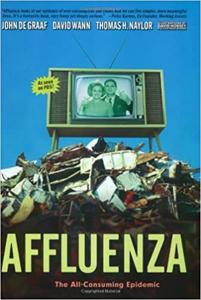
Want to learn the ideas in Affluenza better than ever? Read the world’s #1 book summary of Affluenza by John De Graaf, David Wann, Thomas H. Naylor here.
Read a brief 1-Page Summary or watch video summaries curated by our expert team. Note: this book guide is not affiliated with or endorsed by the publisher or author, and we always encourage you to purchase and read the full book.
Video Summaries of Affluenza
We’ve scoured the Internet for the very best videos on Affluenza, from high-quality videos summaries to interviews or commentary by John De Graaf, David Wann, Thomas H. Naylor.
1-Page Summary of Affluenza
Overview
How many electronic gadgets do you own? Well, you’re reading this on at least one of them. You might have more than one as well. When the newest models are released, do you want to upgrade?
Society has become consumed with consumption. We’re working too much, and it’s making us less happy because we don’t have time for the things in life that matter most to us. In these key points, you’ll learn about our current affliction with affluenza, and what we can do to solve this problem.
Americans are overconsuming products and resources. This can be harmful to their health, as well as the environment. Schools and governments should help reduce this problem by teaching people how to buy less stuff.
Big Idea #1: The Post-Industrial increase in productivity has created an addiction to consumption.
Human beings have existed for the last 200,000 years. During that time, they’ve developed agriculture and industrialized their society. However, if you compress all of human history into a week (and assume a 24-hour day), then only one second will be devoted to the Industrial Age in which we live now.
Since the Industrial Revolution, we’ve consumed more resources than all people in Pre-Industrial human history combined. In America, 71% of our economy is spent on consumer goods. This can be attributed to technology that increases productivity and allows us to produce more with less effort.
People used to think that increased productivity would lead to more free time. In fact, in 1965, the United States Senate predicted that by 2000, the working week would be only 14-22 hours long.
Instead of working less, we’ve continued to work long hours. We’re so busy that some people even work longer now because they can do so on their smartphones and laptops. Our affluenza has gotten worse as a result of our increased production in the last few decades.
We are addicted to buying things. We spend most of our free time shopping and consuming. This addiction prevents us from spending time on the things that really make us happy, like relationships or exercise, for example.
The United States reached a “happiness plateau” in 1957, when the number of people who were very happy started to decline. People think that consumption brings them joy, but it actually lowers their quality of life.
Big Idea #2: We try to compensate for our unhappiness by buying things, but it only makes us feel worse.
Do you have children? If so, what do you do when you’re not looking after them or working? Do you go out, or are your too exhausted to do anything else? Do you find that your free time is spent mostly on the sofa just relaxing and watching TV shows/movies?
Most people would rather flop than work hard. We spend most of our time working to earn money, and we don’t have time for family or friends because of that.
The time we spend with our children is often rushed and unfulfilling. Most of the time, we drive them from one activity to another without spending quality time together. In fact, family meals have declined by 33% since the 1930s.
People spend most of their free time watching TV, and couples no longer do things together but stay at home. This is called cocooning.
People are unhappy in our society, so they buy things to compensate for that. People don’t have enough time to spend with each other because of their busy lives, so they try to buy happiness by buying material goods.
For example, there is a compulsive American buyer who bought several expensive TVs and stereos so that his neighbors would regard him as an expert in electronics.
We are addicted to working and buying, which leads to problems. We buy more stuff in order to alleviate those problems, but that just creates new problems. This cycle prevents us from finding what we really need – connections with other people and nature.





